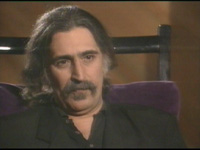
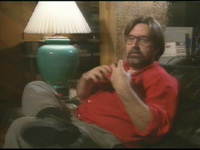
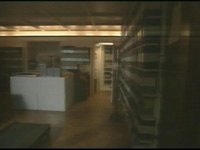
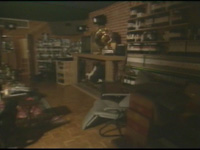
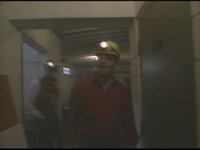
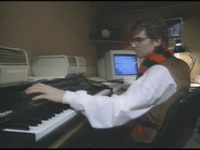
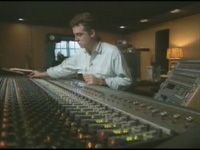

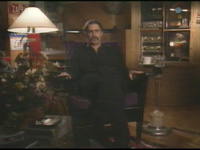

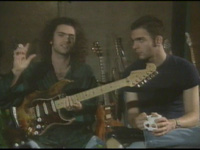
Original Broadcast:
March 11, 1993
BBC2
48 min.
Rebroadcasts:
July 23, 1993
BBC2
+ 90 min. of video fragments
December 17, 1993
BBC2











Presenter: Matthew Collings
Archive Courtesy of: Honker Home Video, Ilona Grundmann Films, Picture Music International, Sender Freies Berlin
Clay Animation: Bruce Bickford
Dubbing Mixer: Tony Hemmings
Camera: Andrew Godfrey
Sound: Ron Brown
Unit Manager: Barry Dixon
Graphic Designer: Steve Bonnett
Film Editor: Colin Minchin
Producer: Nigel Leigh
Director: Elaine Shepherd
Executive Producers: Julian Birkett, Michael Poole
Editor: Janice Hadlow
Timings approximate.
YouTube: The Late Show (BBC, March 12, 1993)—Part 1 (10:00 min.) · Part 2 (10:01 min.) · Part 3 (09:58 min.) · Part 4 (09:55 min.) · Part 5 (06:10 min.)
English TV broadcast an FZ special a couple of times and one of the times with 1 1/2 hours of prev. unreleased live material (mainly).
It was broadcast in "The Late Show" in the summer of 1993 including interviews with FZ, Dweezil, Ahmet, Jim "Motorhead" Sherwood, Ruth Underwood, Steve Vai and "The Father of the Simpsons" (I'm sorry, but his name eludes me for the moment.) The "videos" afterwards includes a BBC recording of King Kong (not broadcast since the late 60's), a lot of live material from various tours and some "videos" of Baby Snakes, Night School and G-Spot Tornado.
Here is, as promised, a more detailed listing of the contents of "The Late Show"'s FZ special:
Length: App. 45 min
The show includes lots of material from Frank's career from the earliest days to rehearsing with Ensemble Modern in the preperation of The Yellow Shark. Also, there are interviews with the following persons: (The brackets is "The Late Show"'s introduction of the persons when they appear)
Matt Groening (Cartoonist "The Simpsons")
Jim 'Motorhead' Sherwood (Saxophonist MOI 1964-69)
Ruth Underwood (Percussionist Zappa Band 1972-76)
Steve Vai (Guitarist Zappa Band 1980-82)
Dweezil Zappa (Son)
Ahmet Zappa (Son)
Frank ZappaAfter the show there is 90 min. with music ONLY. These are the titles and the years in which the performance was recorded:
- King Kong (BBC Studio Recording) 1968
- This Town Is A Sealed Tuna Sandwich from 200 Motels (Royal Festival Hall) 1968
- Cosmik Debris (Probably the same show as A Token of His Extreme) 1974
- City Of Tiny Lights 1979
- Stink Foot (Same as 3) with claymation) 1974
- Baby Snakes (Studio version—the same intro as on the album 'Baby Snakes'. The video contains FZ working with some claymation) 1982
- Stevie's Spanking 1982
- Inca Roads (Same as 3) with claymation) 1974
- San Bernadino (Probably same show as 4)) 1979
- Night School (Claymation) 1986
- You Are What You Are Is (Official Video)
- Camarillo Brillo (Probably same as 4)) 1979
- Muffin Man (Continued directly from 12) 1979
- G-Spot Tornado (Synclavier? Rapidly changing pictures) 1986
- Montana (Same as 3)) 1974
- Black Napkins (Probably same show as 4)) 1979
As far as I can remember, it was shown once in May 93, once in the summer of 93 with a few additions and 90 minutes of live stuff afterwards, and once agiain after he died. Seemingly all of the live video broadcast on the second showing was from official videos not available in the UK—I saw this as an acknowledgement that (a) the vids had never been released so here's what you're missing, and (b) they might never be released in the UK so make the most of it.
I recently visited Frank and did an interview with the BBC. They were doing a Late Show Special on Zappa. They invited some of the ex-Mothers down. It was actually me and Ruth Underwood. They had a bunch of video stuff that I did on the tour that they added in plus a picture of the old school that I took. That aired on March 11. Later on, they're supposed to be doing a longer show. When I went down to see Frank, Johnny Guitar Watson was down. I hadn't seen him in years. Frank had always loved his guitar playing, and Frank and him are very good friends. I didn't even know that at the time. [...] Johnny's not doing anything much at all. I think he's getting an album together that will be released later on this year. As for Frank, he's not doing too well. I guess the cancer problem he's having is moving up into his back and he's having a little bit of trouble getting around, but he's still doing OK. He's just a little bit slower at it.
At the last [June 1993 Jack And Jim] show in Brixton, London, BBC Television came out ot interview me. They had just done a thing on Frank (on the Late Show) and they were going to add some new sections to it. So they asked me a bunch of stuff. Part of the interview was on Beefheart, they were preparing a special on him at the same time. They paid me £200 for that!
Zappa Plays On
by Nigel Leigh
Ill with Cancer modern music's master clown (and Vaclav Havel's good friend) is still working. With his new release, Yellow Shark, he dons the mask of The Serious composer.
FRANK ZAPPA rarely leaves his Hollywood Hills mansion these days. That doesn't mean the creator of classic songs such as Why Does It Hurt When I Pee, The Illinois Enema Bandit and My Guitar Wants To Kill Your Mama, founder member of the Mothers of Invention, guitar hero and satirist isn't hard at work. The self-styled businessman composer's house (expansive living quarters above. state-of-the-art recording studio below) is a hive of activity, as Zappa's technical team put the finishing touches to the forthcoming CD, Yellow Shark. Since disbanding the Mothers in the early seventies, Zappa's prolific musical output has been divided between the rock music that has made him famous, on albums with titles like Weasels Ripped My Flesh, Sheik Yerbouti and You Are What You Is, and the less well known, more.inaccessible compositions that have attracted distinguished orchestral collaborators such as Pierre Boulez and Kent Nagano. He has often become part of the public consciousness for other reasonsnaming his children Moon Unit (girl) and Dweezil (boy), being banned from the Albert Hall, being attacked on stage at the Rainbow, or being accused of anti-Semitism by the Anti-Defamation League for his song "Jewish Princess". A libertarian, pro-market capitalist, Zappa is in a position to release whatever he wants, since he has his own record label, Barking Pumpkin. He hasn't had to deal with corporate executives since he waged legal war against his former record company, Warner Brothers, in 1978. When I first visited the maze-like house (whose style Zappa characterises as "early Rumpelstiltskin") high above Laurel Canyon almost two years ago, a lean, healthy-looking Zappa demanded that I switch off my tape-recorder before revealing that he'd been diagnosed with prostate cancer. Later that year, Dweezil and Moon, responding to rumours in the American press about Frank's impending demise, made an official announcement about their father's condition. The Daily Mail and the Sun took the opportunity to run screaming headlines that Zappa had six months to live. Then last September, confounding tabloid expectations, Zappa turned up on stage in Frankfurt conducting the Ensemble Modern, the chamber orchestra he'd worked with on Yellow Shark, for an evening of avant garde music. However, he was forced to return home early to recover from the strain of rehearsals and performance. "I'm not dead," he confirmed at the time, "and I have no intention of checking out this week or within the foreseeable future". Today Zappa undoubtedly looks paler and weaker than the last time we met, his face a little puffed, his hair more streaked with grey, but there's no mistaking the image. The trademark duster moustache and miniature goatee (officially called an "imperial"), a little shaggier than of late, hang below the prominent aquiline nose that gives its name to his Honker Home Video company. Sitting in the Utility Muffin Research Kitchen studio. However, his mind seems as formidable as ever. Zappa is a hyphenated American (both of his parents are of Italian extraction), but unlike some, he doesn't make a show of his cultural roots. "We didn't live in an ethnic ghetto," he explains, "so I never had a real strong meatball-sandwich identity." In fact Zappa, who's just celebrated his fifty-second birthday, had a largely peripatetic childhood, moving around California, where his father worked as a classified research scientist for the military. "He tried to figure out the best kind of weather patterns to disperse poison gas in time of national crisis," he says dryly. When Zappa graduated from high school in 1958, the family was living in Lancaster, a small desert community beside Edwards Airforce Base, hardly the most congenial environment for the emerging avant garde composer that the young Frank aspired to be. But he did find a kindred spirit in Don Van Vliet, later to be unleashed on an unsuspecting world by Zappa as Captain Beefheart. Although the Zappa-Beefheart relationship deteriorated for a number of years after Zappa produced Beefheart's most admired album, Trout Mask Replica, in 1969, he did rescue Beefheart from conflicting record company contracts, putting him in his band for the Bongo Fury tour. Zappa himself hasn't been on a rock tour since 1988, when his band suffered an acrimonious break-up. Since then, he has concentrated on serious composing. "I can hear it all in my head with good acoustics, and all the rhythms in the right place, the pitch really nice," he explains. "When I have to bring it to an audience, it comes into contact with the laws of physics, and then the trouble begins." Audiences, though, remain an unavoidable necessity for him, as he needs money to pay the technicians who operate his equipment, and to "keep enchiladas coming in for lunch while I write the music". The music is largely dependent on leading-edge technology. "When you're doing electric music, every new device that comes along that allows for the creation of a sound that hasn't existed before should be of interest to you," Zappa says. Since abandoning the guitar three years ago, his main instrument has become the synclavier, a computer-keyboard able to sample any sound. "It expedites everything," says Zappa, comparing it to a word processor that not only helps you write a novel but also reads the book to you as well "To go back to drawing dots on paper would be a punitive experience," he adds, wincing at the thought. It's a surprise, then, to find Zappa suddenly so involved with real musicians in the Ensemble Modern. Yellow Shark contains the kind of music Zappa feels even the machine couldn't do, and that most other musicians couldn't play. "It was pretty much designed for them. The charm of doing the project was in the personalities of the people and what their aesthetic was," he says. In fact Zappa has always been dismissive of the aesthetic of most mainstream classical music, finding it too predictable. "lf you know where the melody is going to go, how long it takes to get there and what it's going to do when it gets there, then why bother to listen to it," he says. He makes an exception of Bach, but only if it's played by Glenn Gould, because he "twists the stuff so that at least there's a question mark inserted into the composition". Gould's "mutation" renders it tolerable for Zappa to listen to. His real love is for the unpredictable, dissonant European music of our own century, as composed by Igor Stravinsky, Anton Webern and above all-Edgard Varese. Varese's lonisation, which the young Zappa discovered when he was a boy in the mid-fifties, is a difficult. Rhythmically asymmetric work, and has remained a source of inspiration ever since. Recently Zappa seems to have had much more impact in Europe than at home, especially with his extracurricular activities. With his businessman's cap on, he advised Vaclav Havel (favourite Zappa album Bongo Fury) on the creation of enterprise culture in post-revolutionary Czechoslovakia becoming for a while the Czechoslovak government's liaison officer to the West. He also took an active interest in Hungarian affairs, and had talks with the vice-president of former Yugoslavia. "I was very optimistic that the people who created the Czech revolution would do a good job once they got control of their own government," he says, "but it turned out that they were not good at it."
Arguably Zappa's natural constituency has been Europe all along, where he concedes there has always been more understanding of his idiosyncratic attempt to blend different musical genres with comedy, but he prefers to underscore just how important being an outsider has been. "If I'd been a European artist," he says, "the audience wouldn't have liked me. The thing that was intriguing to Europeans was that I was an American doing this stuff. It made me stick out like a sore thumb." Something that used to stick out on the early Mothers albums was an opaque quote from Varese that Zappa was fond of citing: "The present-day composer refuses to die." Before leaving, I ask Zappa what this means to him. Avoiding the obvious irony, he offers a deadpan explanation: "I think it's a worthwhile thing to write music," he says, a little hoarsely-a present-day composer refusing to die.
Nigel Leigh is the producer of The Late Show Special on Frank Zappa on BBC2 tomorrow at 11.15pm. Yellow Shark is due to be released on April 24 on Zappa Records. Photograph of Frank Zappa by Fritz Brenckmann.
Additional Informants: Peter Van Laarhoven, Charles Ulrich, Javier Marcote
Maintained by Román García Albertos